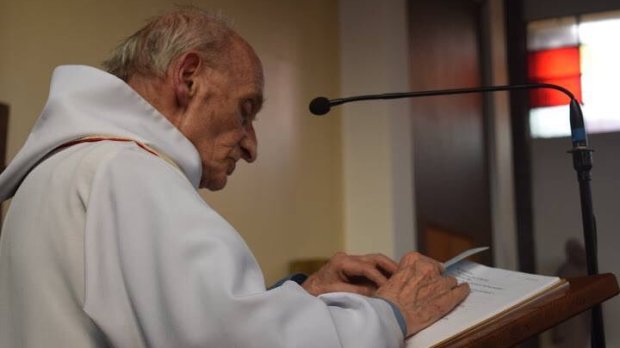He had no way of knowing.
When 85-year-old Father Jacques Hamel went to say Mass in a small village church last Tuesday morning, he had no way of knowing it would be the last Mass of his life.
He had no way of knowing it would be the last time he would make that walk into the church, the last time he would see those faces in the pews, the last time he would gaze at the host in his hands, or raise the chalice—the Body and Blood of Christ.
We know, of course, what happened. How two young men, pledging allegiance to the Islamic State, murdered him during Mass, slashing his throat.
A priest in Britain wrote last week:
“He died, as he believed, on his knees – not in supplication to his spotty murderers, but to the author of life itself to whom he was about to return.”
A priest who knew Father Hamel was horrified—not just at the killing, but that it happened during Mass.
“It’s the moment when the priest is giving this act of love, that he is killed,” he said. “It’s incomprehensible.”
Around the world, people today are calling Father Jacques Hamel a martyr. Some are even calling him a saint.
On social media, priests are using his image, along with the words “Je suis Pretre”…I am a priest. A sign of solidarity, a sign of faith. Those who knew him best remember a gentle, thoughtful, devoted priest, one who was killed near the place where Joan of Arc was martyred, and in a town named for the first martyr, St. Stephen.
His life and death are now a part of our history. He is a symbol, a prophet, a martyr—and, perhaps, a warning to the world.
But that Tuesday morning, which started out as any other morning in his life, Father Jacques Hamel had no way of knowing.
Neither do any of us.
And that, really, is the heart and soul of the scripture readings this Sunday. We cannot know the day or the hour. The fleeting pleasures of this world are just that—fleeting.
This is why the psalmist cries out today: “Teach us to number our days aright…have pity on your servants…prosper the work of your hands.”
In other words: Help us to do what is right, what you want, what is fruitful.
If that message weren’t clear enough, there is the parable we hear in the gospel. The rich man who builds bigger barns to hold all his riches hears God tell him, “You fool!, Tonight your life will be demanded of you…”
He had no way of knowing.
Neither do any of us.
Jesus cautions us to “be rich in what matters to God.”
Yesterday, Pope Francis had a similar message for the young people at World Youth Day.
If anyone worries about the future of the church, or has anxiety about the state of the world, the images and the emotions of World Youth Day can be transformative. Here is the future of the church. It is alive. It is joyful. It is in love with the Lord. And it is brimming with hope.
To these young people, Pope Francis yesterday delivered this beautiful message:
“Unless you offer the best of yourselves,” he said, “the world will never be different.”
“The times we live in,” he explained, “do not call for young ‘couch potatoes’ but for young people with shoes, or better, boots laced. It only takes players on the first string, and it has no room for bench-warmers. Today’s world demands that you be a protagonist of history because life is always beautiful when we choose to live it fully, when we choose to leave a mark. History today calls us to defend our dignity and not to let others decide our future. As he did on Pentecost, the Lord wants to work one of the greatest miracles we can experience; he wants to turn your hands, my hands, our hands, into signs of reconciliation, of communion, of creation. He wants your hands to continue building the world of today. And he wants to build that world with you.”
That is Pope Francis, in Krakow yesterday.
But he could be speaking to us here and now, with this gospel ringing in our ears—and with the tragedy of Father Jacques Hamel still burning in our memories.
Father Jacques was “first string.” He was not a “bench-warmer.” He was 85, 10 years past the age of retirement, but he filled in wherever he could, however he could, to say Mass or hear confessions or anoint someone who was sick. He loved doing the work of the Lord as a priest.
He represented the best of us. He was a man who “numbered his days aright.” He was someone who was rich in what matters to God.
But what about us? We can’t all be priests like Father Jacques. But we can follow his example. We can be people devoted to pleasing God more than ourselves…men and women committed to a cause, Christianity…people who live to witness God’s love in the world.
The scripture this Sunday calls us to that. It calls us to be more than we are. It calls us to “live fully,” as Pope Francis put it, “to choose to leave a mark.”
And it throws down this challenge: What are we doing with the time we have been given? What are we doing to leave a mark?
Let us pray that God teaches us to number our days aright—to live the lives he wants us to, and to make our time “rich in what matters to God.”
Each of us can, if we only choose to do so.
Who can predict what God has planned for us today, tonight, or tomorrow?
Father Jacques had no way of knowing.
And neither do we.

